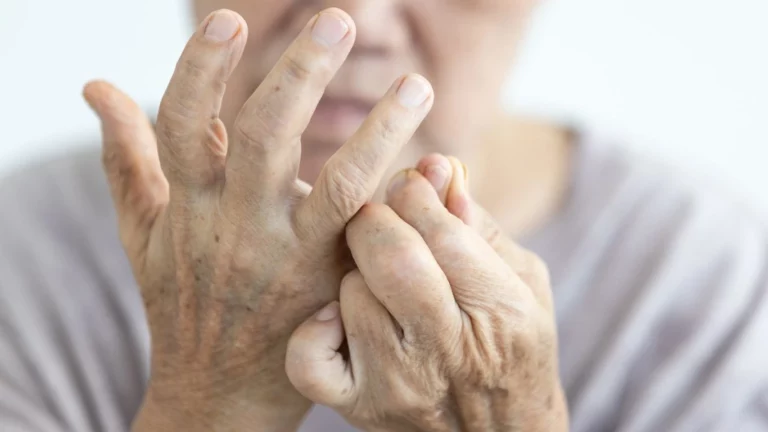Understanding the Connection Between Rheumatoid Arthritis and Mental Health
Living with rheumatoid arthritis (RA) can be physically challenging, but did you know it can also take a toll on your mental health? In this guide, we’ll dive into the link between RA and mental health, and share tips on managing both aspects of this chronic condition.

Managing a chronic condition like rheumatoid arthritis (RA) can be tough—not just on the body, but on the mind as well. It’s easy to overlook how mental health is affected when you’re focused on managing pain and physical symptoms. But the truth is, rheumatoid arthritis and mental health are deeply connected. RA doesn’t just impact your joints; it can also lead to mental health struggles like anxiety, depression, and stress. In this article, we’re going to take a closer look at how these two aspects of health are linked, and what you can do to cope.
Why Rheumatoid Arthritis Affects Mental Health
Rheumatoid arthritis is a long-term autoimmune condition where your body’s immune system attacks your joints. This results in inflammation, pain, and often a decrease in mobility. But RA isn’t just a physical battle—it can also have a serious impact on your emotional well-being. Here’s why:

1. Chronic Pain
Ongoing pain is one of the most distressing aspects of RA. When your body is in constant pain, it’s hard to feel positive or motivated. Chronic pain can also lead to feelings of frustration and helplessness, which can contribute to depression and anxiety.
2. Fatigue and Limited Mobility
RA can leave you feeling drained and unable to do everyday activities. This limits your independence, which can affect your self-esteem and overall mental outlook. You might feel isolated or disconnected from others.
3. Uncertainty and Stress
RA is unpredictable. One day, you might feel fine, and the next day, your joints are swollen and painful. The uncertainty about your health and the possibility of flare-ups can lead to heightened stress levels and anxiety.
4. Social Isolation
Dealing with physical limitations can make social interactions more challenging. People with RA might avoid social situations because they’re afraid of being judged or feeling too tired or uncomfortable to participate. This isolation can contribute to depression and anxiety.
Mental Health Struggles Common in People with Rheumatoid Arthritis
Because of the physical limitations and chronic pain associated with RA, mental health struggles are common. Here are some of the most frequent mental health issues people with RA face:
1. Depression
It’s common for people with rheumatoid arthritis to experience depression. The persistent pain and fatigue can make it feel like life is out of control, and that hopelessness can be overwhelming. Depression in people with RA isn’t just about feeling sad—it can affect every aspect of life, including sleep, appetite, and motivation.

2. Anxiety
Living with the uncertainty of RA, the fear of flare-ups, and the inability to plan ahead due to physical limitations can contribute to anxiety. The constant worry about your health can make it difficult to relax and enjoy life. People with RA are also at higher risk for generalized anxiety disorder (GAD), which involves excessive worry about a variety of everyday issues.
3. Stress and Emotional Strain
Constantly managing the demands of RA, including doctor’s appointments, medications, and flare-ups, can lead to chronic stress. Stress, in turn, can worsen the symptoms of RA by triggering inflammation and pain. It’s a vicious cycle that’s tough to break.
Many people with RA report feeling mentally foggy or forgetful, a symptom often referred to as “brain fog.” It can be frustrating to feel disconnected or unable to think clearly, adding to the emotional strain.
How to Manage Rheumatoid Arthritis and Mental Health Together
If you’re living with rheumatoid arthritis, managing both your physical and mental health is crucial. Here are some practical tips to help you balance both:
1. Talk to Your Healthcare Provider
If you’re feeling down or anxious, talk to your doctor. They can help you understand the mental health aspects of RA and refer you to a therapist or counselor. Sometimes, medications to help with mental health symptoms, such as antidepressants or anti-anxiety meds, may be necessary alongside your RA treatments.
2. Practice Mindfulness and Relaxation Techniques
Mindfulness practices like meditation, yoga, or deep breathing can help reduce stress and improve your mood. These techniques help you stay present and manage the anxiety and emotional strain that come with RA. Even just five minutes a day can make a big difference.
3. Stay Active (As Much as You Can)
Exercise isn’t just good for your body—it’s great for your mental health too! While high-impact activities may be off the table for people with RA, gentle exercises like swimming, walking, or cycling can help reduce pain, improve mobility, and boost your mood. It’s also a great way to combat fatigue.
4. Build a Support System
Having a strong support system is key. Whether it’s family, friends, or online RA communities, connecting with people who understand what you’re going through can help reduce feelings of isolation and depression.
5. Set Realistic Goals and Expectations
Living with RA means that you might have to adjust your lifestyle and goals. Set realistic expectations for yourself and be patient. It’s okay if you can’t do everything you used to do. Focus on what you can do and celebrate those victories.
6. Seek Professional Help When Needed
If your mental health is severely impacted, don’t hesitate to reach out to a mental health professional. Cognitive-behavioral therapy (CBT) has been shown to help people manage depression and anxiety, especially those with chronic conditions like RA.

Conclusion
Living with rheumatoid arthritis is challenging, and it’s essential to understand the connection between RA and mental health. Chronic pain, fatigue, and the emotional toll of dealing with a long-term condition can lead to mental health struggles like anxiety and depression. However, there are strategies to help manage both your physical and mental well-being. By staying active, building a support system, and seeking professional help when needed, you can take steps to improve your overall quality of life.
Appendices
Frequently Asked Questions (FAQs)
- Can rheumatoid arthritis cause mental health issues? Yes, living with RA can lead to mental health issues like depression and anxiety due to the chronic pain, fatigue, and uncertainty of flare-ups.
- How can I reduce stress related to rheumatoid arthritis? Practicing relaxation techniques such as yoga, deep breathing, and meditation can help reduce stress and improve your mental health.
- Is it common for people with RA to experience depression? Yes, depression is common in people with RA. The ongoing pain and limitations can lead to feelings of hopelessness and frustration.
- What are some ways to cope with RA-related fatigue? Gentle exercise, staying hydrated, and taking short breaks throughout the day can help manage fatigue. Rest is also important to prevent overexertion.
- Should I talk to my doctor if I’m feeling anxious or depressed with RA? Absolutely. Your doctor can help address both your physical and mental health concerns and refer you to the appropriate specialists.
References
- American College of Rheumatology (ACR). (2023). Rheumatoid Arthritis and Mental Health. Read Article
- National Institute of Mental Health (NIMH). (2024). Depression and Chronic Illness. Read Article
- Smith, J. et al. (2022). The Impact of Chronic Pain on Mental Health. Journal of Rheumatology, 58(3), 451-459. Read Article
Disclaimer
Disclaimer: The information provided in this article is for educational purposes only and should not replace professional medical advice. Always consult with your healthcare provider before making any changes to your treatment or mental health plan.

Tarra Nugroho is a dedicated Nurse Practitioner with a strong foundation in family and preventive care. She brings both compassion and clinical expertise to her practice, focusing on patient-centered care and health education. As a contributor to Healthusias.com, Tarra translates medical knowledge into clear, empowering articles on topics like women’s health, chronic disease management, and lifestyle medicine. Her mission is simple: help people feel seen, heard, and informed—both in the clinic and through the content she creates. When she’s not caring for patients, Tarra enjoys weekend hikes, plant-based cooking, and curling up with a good health podcast.







